- Home
- Charles L. Grant
Night Songs Page 14
Night Songs Read online
Page 14
He stared as the last car reached the top of the slope, flared its red taillights and sped inland across Flocks. After it was gone, he shook his head and brushed a hand down over his yellow slicker, straightened his yellow nor-easter, sniffed and coughed loudly. The spoked wheel in his left hand was slick with sweat, and he slipped his palm around it absently, turning it once to make sure it still worked.
He was tired. That damned fool Screamer had these idiots pissin' in their pants they were so anxious to get away.
He groaned as he slipped off the stool and opened the narrow door, sidled out and walked stiffly to the ferry's steel lip resting against its place on shore. He grabbed the hooked end of the rusted iron guard chain, drew it across the opening and snapped it back into its eye. A loud sigh just for the sound, and he pulled the slicker open, his hands reaching around to grip the small of his back. He stretched, rolling at the waist while he groaned loudly again, blinked rapidly, taking in deep breaths and blowing them out in short, sudden bursts.
He was God-almighty and lay-me-down-to-die tired. And he was thirsty enough to empty the bay, what with all that exhaust and crap lodged in his throat. He coughed, spat, and the oily, metallic taste made him grimace and swear and think fondly of the cheap brandy he kept in his shack.
As he stepped to the right he heard the noise.
At first he thought it was a damned fool oil truck barreling down the highway through the state forest. That's what it sounded like, by God, and he was in no mood to tell the dumb ass driver politely there was no way in God's hell he was going to put such a rig on his poor little boat. Jesus, the old girl barely made the last crossing she was so weary of all the loads.
He stepped over the chain and walked to shore, kicking aside gravel and spitting toward the water. Goddamned Screamer, sending all them idiots inland like they never saw one before and thought they'd be dead come morning. Fools. A little wind never hurt nobody if you was careful. Fools.
Then the noise changed.
Over the roaring, the rumbling, he heard a whispering and a whistling that brought to mind dreams he'd just as soon not remember; but he was curious enough at last to take the slope to the road, shaking his head and muttering to his fists and not looking up at all until he reached the flat.
And when he did, his one eye widened, his bristled chin dropped, and he half turned to run, though he knew he wouldn't make it.
It wasn't a truck, or a van, or a race car without mufflers. It was the wind.
He could see it coming, though it was half a mile away. The woods closest to him didn't move at all, were dark and normal and holding shadows to their trunks. But straight down the road it was different- dust and leaves and branches and small stones were churning and spinning and dancing straight for him as if an invisible tidal wave were shoving them toward the beach. The stones he could see, and the branches and the dust, but the wind was without form. As far as he could tell it held to the road, and he could see it all coming, half a mile and closing. The trees on either side bent away, groaned away, some of the older ones nearly snapping in two, losing large boughs that bounced and pin wheeled into the woods, or slammed onto the tarmac and trapped leaves and dust and pebbles in their webs.
Wally only had time to throw himself down below the top of the slope and cover his head with his arms.
And it was on him.
Whispering and whistling, stabbing him in a hundred places, raising welts across his knuckles, stinging his neck and rattling against the slicker. His face turned toward the bay, and he could see the ferry lift and draw back, the moorlines creaking and straining. The water broke into whitecaps that swept toward the island, crashing high against the boulders that marked the opposite shore, spraying the trees and turning the air gray.
And just when he thought he was going to have to scream, just when he thought the air would be sucked clean from his lungs, it was gone.
Just like that it was gone.
One minute hell had been stamping hobnails and boulders all over his back, and the next it was as peaceful as it ever gets at night. Unsteadily, licking at his lips and being careful of his legs, he rose to his feet and stared at Haven's End. The wind was gone, and the only thing that let him know he hadn't dreamt it was the blood he wiped from the backs of his hands, the only way he knew he wasn't part of the Screamer was the direction.
And if it wasn't the Screamer…
The ferry rocked, slower, slower.
The whitecaps vanished.
Behind him, the forest was as quiet as dawn.
Jesus damn, he thought, and raced for the pistol he'd put under the cot's mattress. Jesus God damn! He'd better get himself a gull soon, because this place wasn't healthy.
***
By the time the wind reached the ocean it was spent, and the debris it had carried had been dropped in the bay; the few outside to hear it thought it was thunder over the horizon. When it rushed past them, they ducked away and yanked up their collars, thinking for sure they'd be drenched in a moment and goddamn the weatherman who can't read his own charts. And when it was quiet, no rain or lightning, they shrugged and headed home, and wondered about their neighbors. Blaming it on the Screamer was for some too easy; that wasn't due until late the next day, plenty of time to board the windows, fetch the cat, and take the ferry out. No, there was something more, they thought. Folks were unaccountably nervous, but the leaving seemed over and the night was fairly calm despite the clouds overhead. Supper, then, and the news, and a quick change of clothes. After all, it was Friday, with, half-priced beer at the Anchor Inn and quiet music at the Run, a new double feature at the theater and some TV before bed.
And only a few stopped to listen, with a nervous snap of their fingers.
***
The wind dropped to a breeze, and Lilla didn't know the difference.
She sat alone, cross-legged on the ground in front of the shack, and didn't bother to count the minutes until the sea turned black. The waves flared white, between the clouds there were stars, and once in a while at the horizon she could see the multi-colored eyes of a slow-passing liner. She was still in her black dress, and loose around her shoulders was a faded blue woolen shawl; she drew it snugly over her chest and nuzzled her chin into the worn tufts that had never been trimmed. She thought of nothing.
She rocked on her buttocks and didn't feel the sand. Her tangled hair stirred and she didn't feel the cool. She rocked, and she hummed, and when the night had gone full dark she wiped a bubble of saliva from the corner of her mouth.
She thought nothing, and that was fine.
The fog was with her, comforting and warm and sparkling like diamonds snared in a spider's web especially for her. It dazzled and it lulled, and though she could not reach out to touch it, it felt very strong. It protected her. It hid her. It trembled when there was danger and it floated when Gran was back.
As it floated now when she heard the shack's door rasping open behind her. It closed, and the web shuddered. Her nostrils flared at the acrid scent of spilled blood.
Blood; the web vibrated. Blood; the web parted. Blood and Warren Harcourt, and suddenly the fog was gone, the web torn, and she was running. Down to the beach where she stood at the brink of the climbing tide's foam and dared herself to walk in, walk in and keep on walking until she would either force herself to swim or choose to join her parents.
You told me they'd come back, Gran. You told me. You did.
A wave fanned in, pulled back, covering her feet with dark sand.
But Gran was angry now and wouldn't talk to her, not even in the fog. Not since that first time, after the funeral, after she'd found him and brought him back and sung him the words that had brought her the blood.
He was supposed to have been grateful, and he was supposed to have been smiling. But she knew now he had lied to her, lied to his Lilla. He had lied, he was angry, and he wouldn't let her go.
She was frightened. She had spent the remainder of the night hiding in a cave just bel
ow the top of the cliffs, a cave not even Gran knew was her place to escape all the demons and ghosts. All day she had stayed there, until she thought she was safe. Then she had run to find someone to tell them Gran had come back.
She really hadn't wanted to scare the little boy but she knew him (forgot his name), and she knew he was Gran's favorite because he could do things with his hands, and she knew he was close to Colin, and she needed to talk to Colin now more than anything in the world. And when he hadn't come, the fog had come instead, and Colin (and the little boy with no name) was forgotten because the fog and the web and the diamonds were so pretty, and so warm, and the way it used to be when Gran loved her and held her and wouldn't let anyone do her harm.
She glanced furtively at the shack as if he'd somehow overheard her, and she was running again, veering sharply off the beach and scrambling over the dunes toward the houses. The big houses. The rich houses. Past their warm yellow lights and their warming shining cars and their warm pretty gardens bedded down for the winter. Past them and soon onto Neptune, past the darkened boarding house where her nostrils flared and she thought she smelled the blood.
It was easy, she told herself. If Colin wouldn't come to her, she would find him at home.
Because of all the people on the island, only he would understand when she told him about Gran.
Only he would understand why Gran had her singing.
She was halfway to the cottage when she felt Gran slipping back to spin the web, ride the fog. Tugging, coaxing, urging her back. No, she thought, no, I won't let you! And she was startled when the tugging stopped and she was left alone to keep running. She knew then his strength wasn't as great as she'd believed. Despite the sacrifice of Warren Harcourt's blood-the only time Gran walked, so he could drink the blood himself-it would take him a long time to be what he wanted. Meanwhile she had a chance. She had a chance to warn Colin, who would warn Garve and the others.
Warn them. Warn them. Like someone she knew from history who warned all the people that the enemy was coming.
Warn them, she had to warn them-and she stumbled. About what?
A frown loosened sand caked to her forehead and her lips tasted salt when her tongue flicked out.
I have to warn…
About what, Lil? About what?
Concentration quivered her lips. Warn them about Gran, about the singing, about the… rest.
She slowed and shook her head to rid it of the fog. She slowed and looked up, and saw the stars between the clouds. They were pretty. They always used to be pretty, but now they were prettier than she'd ever seen them before. Winking at her like lovers she had stored in her dreams, not cold as in all the poems, but whitely warm and… pretty.
She slowed to a walk.
Pretty stars, lovers' stars, and her eyes darted from side to side because she knew she was going to the cottage where Colin lived and did his work, and if she took her time and thought hard she might remember why.
***
The reception room at Doc Montgomery's used to be the garage. Now it was paneled in pine, carpeted in soft gold, furnished with Audubon prints and up-to-date-magazines, two beaten leather sofas and a handful of upholstered chairs. It smelled of lemon polish and recent cleaning. The five narrow windows had just that morning been washed.
Colin stood by the entrance, one hand on the door frame. He was frowning. The odd wind had battered through only five minutes before, and already he was wondering if it had been his imagination. A howling, and a whistling, and leaves slapped against the panes, and Peg, sitting on a sofa beside Garve, had nearly jumped into his arms. Now it was quiet. Dark, quiet, the radio on the end table switched off when they arrived.
Doc was in the examination room with Warren, Annalee assisting. Eliot was on his way to Flocks with a clear plastic bag containing Harcourt's wallet which Garve had found at his side.
Colin shivered against a cold that wouldn't leave his system, turned away from the window and leaned against the wall. Peg had driven back for the chief when Colin insisted on remaining behind, had returned in less than five minutes, but five minutes too long. He'd had a chance to look at Warren, at all that goddamned blood on his clothes and on the ground, and he'd had a chance to wonder who would want to kill a harmless alcoholic. Garve had asked the same question while he examined the corpse without touching it, wondering aloud about Cameron's friends, wondering aloud about Jim Fletcher and the enemies he had made. It was all speculation. No weapon was found, no footprints, no clues. Then Eliot had arrived with the patrol car, and Montgomery.
All the doc had said was, "It's too dark to do anything out here. Let's bring him back to my office."
A green plastic sack was zipped closed around him, and he was placed in the trunk and driven back.
While Montgomery played coroner, Garve asked the questions.
That was fifteen minutes ago, and now he was silent.
"I don't get it," Colin said at last, not liking the quiet. "I just don't get it."
Peg murmured helplessly, her hands winding and twisting in the folds of her lap. A strand of damp hair was slanted across her forehead.
Garve shoved himself to his feet and paced the width of the room, stared out at the night, closed the curtains and turned around. "Here," he said and he patted his stomach, "I know it was Theo Vincent. But…"
"But what?" Colin said impatiently.
"But where's the murder weapon, the proof, the evidence? Why would someone want to cut that poor dope's throat?"
"He knew something he shouldn't have," Peg suggested.
"Oh sure," he said sourly. "Sure."
"Well, hell, Garve," Colin said, "he walked all over the place all the time when he wasn't drinking. He could have heard things, known things-jeez, he even knew about Peg and me, I know I didn't tell him." He pushed away from the wall and sat next to Peg. "He might have heard them talking about… something, I don't know what."
"That's just it," Tabor said. "You don't know, and I don't know."
"So are you just going to forget it?"
The look was one of tolerant disgust. "Of course not. I'll go over and have a word with them, as soon as Doc's finished. But I'll tell you this, m'boy, I won't get what I want. They'll be surprised, y'see, and shocked, and they'll alibi each other until the tide turns and then some."
"It sounds to me like you're already giving up."
"No, just being realistic."
"What about the wallet?" Peg said. "Eliot's going all the way into-"
"Because there's a very small chance it just didn't fall out of his coat when he fell. There's a chance someone picked it out, and if they did there'll be fingerprints. Or maybe whoever did it picked it up, dropped it again when he heard someone coming. I don't know," he said in irritation. "Christ, I wish I did."
The far door opened and Hugh Montgomery came out. He was small, sandy-haired, his over-sized glasses continually slipping down his nose. When he smiled there was a large gap between his two front teeth, a gap made larger by the handlebar mustache waxed and poking below his chin. His white coat was stained faint red, and he was drying his hands on a towel.
"Razor," he said. "One slice. Sometime this morning, I'd say shortly after midnight. Can't be sure, but I don't think I'm far wrong."
Tabor reached for his coat. "Anything else?"
"What else is there?"
"You're the doctor, you tell me."
Montgomery scowled, and pushed at his glasses. "There is nothing else."
"Suicide?" Peg asked in a small, trembling voice.
"Absolutely not." He gave her a quick smile. "You want the details?"
"Thank you, Hugh, no."
"I'll be back," the chief said, and left with a brusque nod.
The moment he left, Montgomery stripped off his coat and tossed it into the other room, made for the nearest chair and fell into it with a sigh. He took off his glasses and rubbed the bridge of his nose. "Brother," he said quietly. "Brother."
Colin wa
nted to leave, but he couldn't help thinking of the way he'd found Warren, and that the lawyer was lying dead on the other side of the wall just behind him. The thought held him, and he barely felt Peg's hand slip into his own and squeeze.
"They're going to get away with it, aren't they," he said.
"Who?"
"Lombard. Vincent."
Montgomery shook his head. "Now, you don't know that, Colin, any more than Garve does. And if you want my opinion, I'd say you were wrong."
"Oh really?"
Hugh nodded. "Really. It serves them no purpose-"
"-unless Warren knew something he shouldn't."
"And it isn't their style." Then he looked deliberately at Peg. "I know what you're thinking, dear, but live years ago they were too far away from setting up the casinos, and they might have taken the chance. If, of course, these are the same men. But not this time. This time, if you'll excuse me, Colin, they're damned close to winning."
"I know," Colin said, shifting into the sofa's corner.
"So why screw up a good thing?"
"Because if Warren talked… about whatever… they'd lose for sure. And even Cameron's not stupid- if they lose this time it won't come up again."
Montgomery replaced his glasses, and whistled soundlessly through the gap in his teeth. "Colin, think about what you're saying here. Who would listen to him, really? Warren? Our Warren? A nice guy drunk, a self-pitying slob sober. If he walked up to you and said he knew something terrible was going on between Cameron and those men, would you believe him? Quite aside from the fact that it wouldn't surprise any of us, would you believe it if Warren told you?"

![[Oxrun Station] The Orchard Read online](http://i1.bookreadfree.com/i/03/17/oxrun_station_the_orchard_preview.jpg) [Oxrun Station] The Orchard
[Oxrun Station] The Orchard![Riders in the Sky - [Millennium Quartet 04] Read online](http://i1.bookreadfree.com/i/03/20/riders_in_the_sky_-_millennium_quartet_04_preview.jpg) Riders in the Sky - [Millennium Quartet 04]
Riders in the Sky - [Millennium Quartet 04]![Chariot - [Millennium Quartet 03] Read online](http://i1.bookreadfree.com/i/03/19/chariot_-_millennium_quartet_03_preview.jpg) Chariot - [Millennium Quartet 03]
Chariot - [Millennium Quartet 03]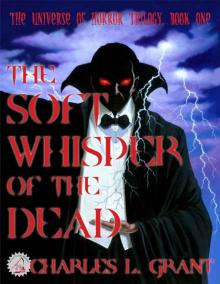 The Universe of Horror Volume 1: The Soft Whisper of the Dead (Neccon Classic Horror)
The Universe of Horror Volume 1: The Soft Whisper of the Dead (Neccon Classic Horror)![[Oxrun Station] Dialing The Wind Read online](http://i1.bookreadfree.com/i/03/19/oxrun_station_dialing_the_wind_preview.jpg) [Oxrun Station] Dialing The Wind
[Oxrun Station] Dialing The Wind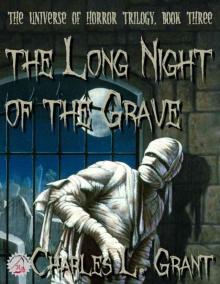 The Universe of Horror Volume 3: The Long Night of the Grave (Neccon Classic Horror)
The Universe of Horror Volume 3: The Long Night of the Grave (Neccon Classic Horror)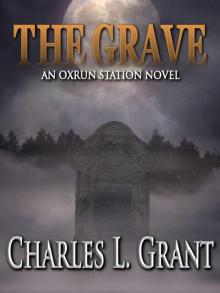 The Grave - An Oxrun Station Novel (Oxrun Station Novels)
The Grave - An Oxrun Station Novel (Oxrun Station Novels)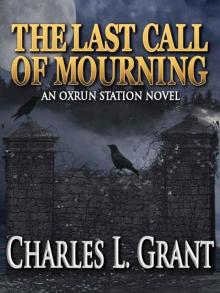 The Last Call of Mourning - An Oxrun Station Novel (Oxrun Station Novels)
The Last Call of Mourning - An Oxrun Station Novel (Oxrun Station Novels)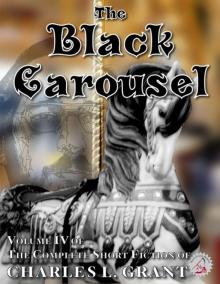 The Complete Short Fiction of Charles L. Grant, Volume IV: The Black Carousel
The Complete Short Fiction of Charles L. Grant, Volume IV: The Black Carousel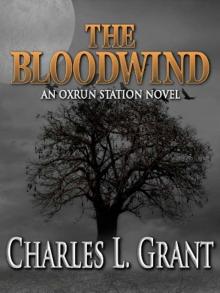 The Bloodwind - An Oxrun Station Novel (Oxrun Station Novels)
The Bloodwind - An Oxrun Station Novel (Oxrun Station Novels)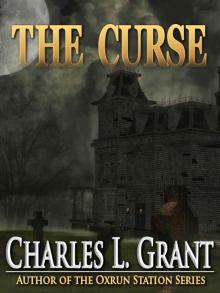 The Curse
The Curse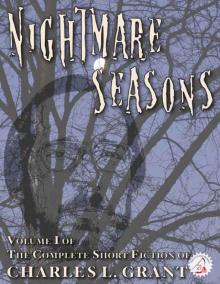 The Complete Short Fiction of Charles L. Grant Volume 1: Nightmare Seasons (Necon Classic Horror)
The Complete Short Fiction of Charles L. Grant Volume 1: Nightmare Seasons (Necon Classic Horror)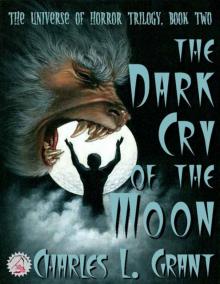 The Universe of Horror Volume 2: The Dark Cry of the Moon (Neccon Classic Horror)
The Universe of Horror Volume 2: The Dark Cry of the Moon (Neccon Classic Horror)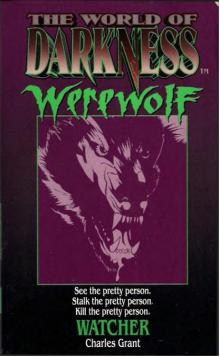 Watcher: Based on the Apocalypse (World of Darkness : Werewolf)
Watcher: Based on the Apocalypse (World of Darkness : Werewolf)![[Oxrun Station] The Bloodwind Read online](http://i1.bookreadfree.com/i/03/25/oxrun_station_the_bloodwind_preview.jpg) [Oxrun Station] The Bloodwind
[Oxrun Station] The Bloodwind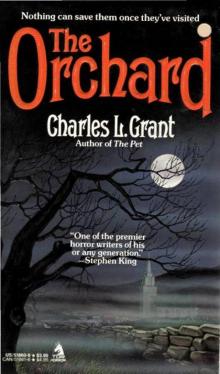 The Orchard
The Orchard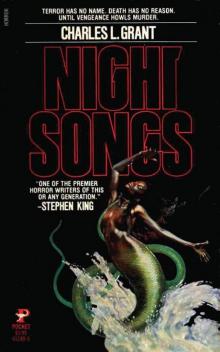 Night Songs
Night Songs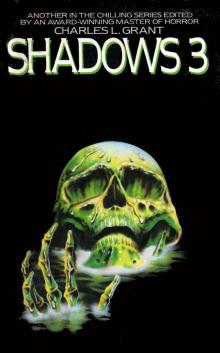 Shadows 3
Shadows 3![Symphony - [Millennium Quartet 01] Read online](http://i1.bookreadfree.com/i1/04/02/symphony_-_millennium_quartet_01_preview.jpg) Symphony - [Millennium Quartet 01]
Symphony - [Millennium Quartet 01] The Hour of the Oxrun Dead (Necon Classic Horror)
The Hour of the Oxrun Dead (Necon Classic Horror)![In the Mood - [Millennium Quartet 02] Read online](http://i1.bookreadfree.com/i1/03/31/in_the_mood_-_millennium_quartet_02_preview.jpg) In the Mood - [Millennium Quartet 02]
In the Mood - [Millennium Quartet 02]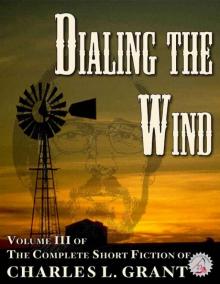 The Complete Short Fiction of Charles L. Grant Volume 3: Dialing the Wind (Neccon Classic Horror)
The Complete Short Fiction of Charles L. Grant Volume 3: Dialing the Wind (Neccon Classic Horror)![[Oxrun Station] The Last Call of Mourning Read online](http://i1.bookreadfree.com/i2/04/05/oxrun_station_the_last_call_of_mourning_preview.jpg) [Oxrun Station] The Last Call of Mourning
[Oxrun Station] The Last Call of Mourning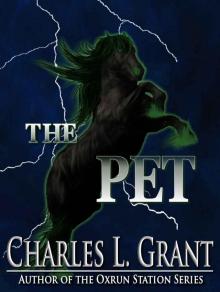 The Pet
The Pet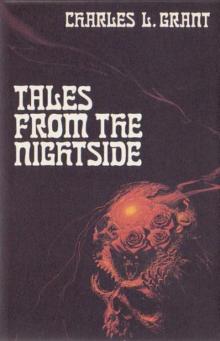 Tales from the Nightside
Tales from the Nightside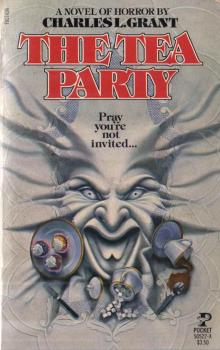 The Tea Party - A Novel of Horror
The Tea Party - A Novel of Horror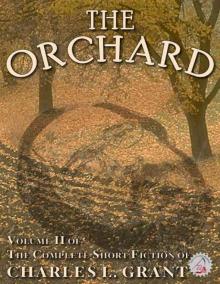 The Complete Short Fiction of Charles L. Grant Volume 2: The Orchard (Necon Classic Horror)
The Complete Short Fiction of Charles L. Grant Volume 2: The Orchard (Necon Classic Horror) Whirlwind
Whirlwind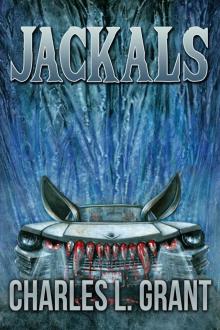 Jackals
Jackals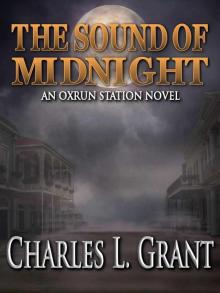 The Sound of Midnight - An Oxrun Station Novel
The Sound of Midnight - An Oxrun Station Novel